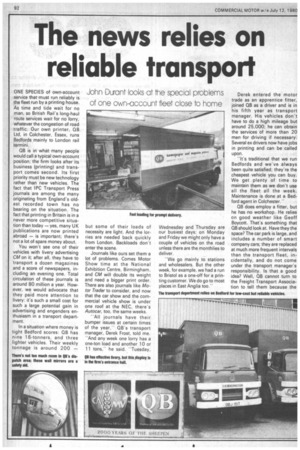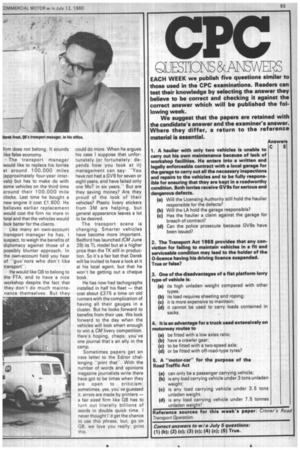The news relies on reliable transport
Page 94

Page 95

If you've noticed an error in this article please click here to report it so we can fix it.
John Durant looks at e special problems of one own-account fleet close to home
ONE SPECIES of own-account service that must run reliably is the fleet run by a printing house. As time and tide wait for no man, so British Rail's long-haul route services wait for no lorry, whatever the congestion of road traffic. Our own printer, GB Ltd, in Colchester, Essex, runs Bedfords mainly to London rail termini.
QB is in what many people would call a typical own-account position; the firm looks after its business (printing) and transport comes second. Its first priority must be new technology rather than new vehicles. The fact that IPC Transport Press journals are among the many originating from England's oldest recorded town has no bearing on the situation. The fact that printing in Britain is in a never more competitive situation than today — yes, many UK publications are now printed abroad — is important; there's not a lot of spare money about.
You won't see one of their vehicles with livery advertising CM on it; after all, they have to transport a dozen magazines and a score of newspapers, including an evening one. Total circulation of these journals is around 80 million a year. However, we would advocate that they paid more attention to livery: it's such a small cost for such a large potential gain in advertising and engenders enthusiasm in a transport department.
In a situation where money is tight Bedford scores: QB has nine 16-tonners, and three lighter vehicles. Their weekly tonnage is around 200 —
but some of their loads of necessity are light. And the lorries are needed back quickly from London. Backloads don't enter the scene.
Journals like ours set them a lot of problems. Comes Motor Show time at the National Exhibition Centre, Birmingham, and CM will double its weight and need a bigger print order. There are also journals like Motor Trader to consider, and now that the car show and the commercial vehicle show is under one roof at the NEC, there's Autocar, too, the same weeks.
"All journals have their bumper issues at certain times of the year," GB's transport manager, Derek Frost, told me. "And any week one lorry has a one-ton load and another 10 or 11 tons,he said. "Tuesday,
Wednesday and Thursday are our busiest days; on Monday and Friday we might only have a couple of vehicles on the road unless there are the monthlies to deliver.
"We go mainly to stations and wholesalers. But the other week, for example, we had a run to Bristol as a one-off for a printing customer. We do go to most places in East Anglia too." Derek entered the motor trade as an apprentice fitter, joined GB as a driver and is in his fifth year as transport manager. His vehicles don't have to do a high mileage but around 25,000; he can obtain the services of more than 20 men for driving if necessary. Several ex drivers now have jobs in printing and can be called upon.
"It's traditional that we run Bedfords and we've always been quite satisfied; they're the cheapest vehicle you can buy. We get plenty of time to maintain them as we don't use all the fleet all the week. Maintenance is done at a Bedford agent in Colchester."
QB does employ a fitter, but he has no workshop. He relies on good weather like Geoff Boycott. That's something that GB should look at. Have they the space? The car park is large, and includes a number of smart company cars; they are replaced at much more frequent intervals than the transport fleet, incidentally, and do not come under the transport manager's responsibility. Is that a good idea? Well, QB cannot turn to the Freight Transport Association to tell them because the firm does not belong. It sounds like false economy.
The transport manager would like to replace his lorries at around 100,000 miles (approximately four-year intervals) but has to make do with some vehicles on the third time around their 100,000 mile clocks. Last time he bought a new engine it cost £1,600. He believes earlier replacement would cost the firm no more in total and that the vehicles would look better for the clients.
Like many an own-account transport manager he has, I suspect, to weigh the benefits of diplomacy against those of a possibly blunter approach. In the own-account field you hear of "guy'nors who don't like transport''.
He would like GB to belong to the FTA, and to have a nice workshop despite the fact that they don't do much maintenance themselves. But they could do more. When he argues his case I suppose that unfortunately (or fortunately: depends how you look at it) management can say: "You have not had a GV9 for seven or eight years, and have failed only one MoT in six years." But are they saving money? Are they proud of the look of their vehicles? Plastic livery stickers from 3M are helping, but general appearance leaves a lot to be desired.
The transport scene is changing. Smarter vehicles have become more important. Bedford has launched (CM June 28) its TL model but at a higher price than the TK still in production. So it's a fair bet that Derek will be invited to have a look at it at his local agent, but that he won't be getting out a cheque book
He has now had tachographs installed in half his fleet — that cost about £375 a time on old runners with the complication of having all their gauges in a cluster. But he looks forward to benefits from their use. We look forward to the day when the vehicles will look smart enough to win a CM livery competition. Here's hoping, chaps; you've one journal that's an ally in the camp.
Sometimes papers get an irate letter to the Editor challenging "print that". With the number of words and opinions magazine journalists write there have got to be times when they are open to criticism; sometimes, yes, you've guessed it, errors are made by printers — a fair sized firm like GB has to turn out literally billions of words in double quick time. I never thought I'd get the chance to use this phrase, but, go on GB. we love you really: print this












































































































































